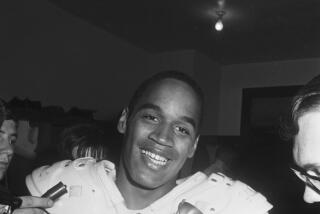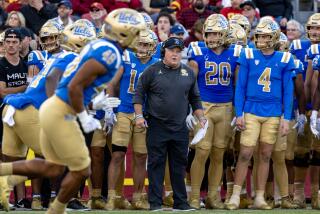This isn’t the ending anyone could have foreseen for Joe Paterno
It is almost impossible to overestimate the impact Joe Paterno has had on Penn State since he joined Rip Engle’s staff as a 23-year-old assistant in 1950.
Sixty-two years in one place, with one love, with one purpose — to win and act the right way.
So how does all that go wrong in four days?
It is impossible to overestimate how shocking the revelations of the weekend have been to the Penn State community and a community at large.
Paterno turns 85 on Dec. 21 and there were a thousand ways to imagine how his career might end. This one was not on the list.
An alleged child sex-abuse scandal involving longtime assistant coach Jerry Sandusky, a man once considered a possible successor to Paterno’s dynasty?
In 1969, President Richard Nixon ignored Penn State’s undefeated team and anointed Texas the national champion after the Longhorns’ 15-14 win over Arkansas.
Paterno would years later quip, “How could Nixon know so little about Watergate and so much about football?”
The question is now being asked: “How could Joe have known so little?
Or done so little?
It seems incomprehensible that a man who built a football empire on honesty, morals and ethics could hear news in 2002 about a possible sexual molestation in his locker room shower and not do more than what was legally required.
It could be argued men of far less moral character would have gone straight to the police or, at least, demanded university officials do the same.
Paterno was an English major at Brown University. He molded linebackers Ham, Millen and Arrington as he devoured the works of Ibsen, Browning and Aquinas.
Paterno envisioned what he called the “Grand Experiment,” a gridiron utopia where winning big and thinking big were not mutually exclusive.
He loves to quote Robert Browning’s line, “a man’s reach should exceed his grasp, or what’s a heaven for?”
Paterno’s idea was to blend Ivy League intellectualism, content-of-character principles and helmet-to-helmet contact to a land-grant state university.
He was an ornery coach, let there be no doubt. He intimated players in the early years to the extent some crossed the street if Joe was coming their way.
He was prickly to the press and ruled State College in isolated impunity.
And his “experiment” was a spectacular success.
Paterno, who took control in 1966, had his first undefeated season by 1968. He won national titles in 1982 and 1986. He won early, late, often and with class.
At a 1973 commencement address he opined, “Success without honor is an unseasoned dish. It will satisfy your hunger, but it won’t taste good.”
Paterno railed against rule-breakers and once let it slip he did not want to retire and leave college football to “the Barry Switzers and Jackie Sherrills of the world.”
Penn State and Stanford share the distinction of never receiving a major NCAA violation.
Paterno turned Penn State into football “Brand X,” a generic for good. There would never be names on the backs of the plain, white-and-blue uniforms.
His rolled-up khaki pants and Coke-bottle glasses became iconic. Paterno had his own flavor, “Peachy Paterno,” at the local ice cream parlor.
This year’s team is 8-1 entering the game Saturday against Nebraska, yet plenty of people said he should have retired years ago.
Others maintain his contributions give him the right to dictate the terms of his departure. He was and “is” Penn State. He met future wife, Sue, on campus. The Paternos have donated millions to the school and all five of their children are Penn State graduates.
A Happy Valley ending seemed possible only two weeks ago, when Paterno recorded career victory No. 409. It moved him past Grambling’s Eddie Robinson into first place on the major-college victory list.
Former Florida State coach Bobby Bowden, who grew up idolizing Alabama’s Bear Bryant, said Paterno would be remembered as the greatest.
“To me,” Bowden once said, “Joe has done everything right.”
It was surreal to see Tuesday unfold as reporters and cameramen staked out Penn State as a crime scene. Paterno, like some Lindsay Lohan, ducking into a car as the paparazzi descended. Later, students rallied in his support outside of Paterno’s house.
What planet was this?
Paterno’s scheduled weekly news conference had been canceled by the administration less than an hour before its scheduled start.
Paterno, besieged by reporters as he tried to make his way to practice, said he wanted to address the subject.
“I know you guys have a lot of questions and I was hoping I was going to be able to answer them today,” he said. “But we’ll try to do it as soon as we can.”
Soon may not be soon enough.
Paterno’s son Scott, a lawyer, said “No one has asked Joe to step down.” Scott Paterno said his dad expected to be coaching Saturday and for the long haul.
Tuesday might have been the longest day in Paterno’s six decades on campus.
At ESPN’s studios, Matt Millen broke down on air as he tried to provide analysis. Millen was a star linebacker at “Linebacker U” in the late 1970s. Millen was on the board of Sandusky’s “Second Mile” Foundation.
The “Grand Experiment” had gone awry.
“It makes you sick, to see that this could happen,” Millen said on air. “This is more than just a program. This is more than just a football legacy. This is about people. And if we can’t protect our kids, we as a society are pathetic.”
Joe Paterno doesn’t need those thick glasses any more. He had laser surgery to correct his vision problem.
Yet, as it stands in State College, his legacy could not be more out of focus.
More to Read
Get our high school sports newsletter
Prep Rally is devoted to the SoCal high school sports experience, bringing you scores, stories and a behind-the-scenes look at what makes prep sports so popular.
You may occasionally receive promotional content from the Los Angeles Times.







